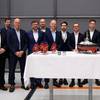ABS Calls for New Tech in Marine Fuels
ABS Chairman, President and CEO, Christopher J. Wiernicki, mapped out the future of marine fuels, indicating that the 2050 targets will require technology beyond today’s state-of-the-art.
“Technology advances of the next decade may entirely change our view of the future, but based on what we see today we can identify three developmental pathways for future fuels distinguished by the onboard technologies they require. These are: the LNG or light gas pathway, the bio/synthetic pathway and the alcohol and heavy gas pathway,” he said.
“Within each of these pathways are many variables related to energy content, the state of storage or containment technology, and the overall maturity of the fuel’s technology,” said the chairman of the global provider of classification and technical advisory services to the marine and offshore industries.
“The reduction targets by 2030 are challenging but we know today’s technology can get us there if we basically focus on LNG as a fuel, speed optimization, and more efficient utilization of the voyage. But if we are going to reach 2050 goals, much of the new capacity going into 2030 is going to have to be zero carbon.”
He suggested there may not be one dominant fuel of the future, but a range of options tailored to each market sector.
“What is clear is that selection of the most appropriate fuel and related technology will clearly need to take into consideration the operational profile and trade of the vessel. The development of new ship designs should incorporate all these aspects to be fit for purpose,” he added.
“Though, we are fuel and technology agnostic, ABS focuses on working across the board to help owners not only reach their decarbonization and sustainability targets but hit them successfully, while maintaining a laser focus on safety.”
Ultimately, he stressed that 2050 success is a “team sport”.
“The shared target of decarbonization that distinguishes our journey to 2050 is giving rise to a certain convergence in our industry, a meeting not necessarily of strategic interests or business practices or even global approaches, but of goals,” he said. “A general rule for going forward with maximum success is that digital, mechanical and human factors-related technologies must advance together, so that safety is never compromised by technology.
“This means that, in terms of reaching the common goal of decarbonization, a new thread of convergence among designers, operators, owners, shipyards and also equipment manufacturers must evolve.”













